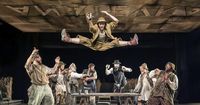When Jordan Fein picked up the phone to tell his grandmother he’d be directing a new production of Fiddler on the Roof in London, she immediately broke into song. Her rendition of "If I Were a Rich Man" wasn’t just pitch-perfect—it was a living testament to how deeply the 1964 musical has woven itself into the fabric of Jewish-American families. Fein’s own roots stretch back to Kyiv, where his great-grandparents began their journey to Philadelphia, and for him, Fiddler on the Roof was more than just a show. It was a family heirloom, a piece of history that echoed the stories his elders rarely spoke aloud.
On August 16, 2025, Fein’s revival of the iconic musical is the talk of London’s theatre scene, and for good reason. This production, which recently scooped up three awards at the 2024 Olivier Awards—including best new revival and best set design for Tom Scutt—will soon head to Dublin’s Bord Gáis Energy Theatre from October 7th to 18th. According to The Irish Times, Fein’s vision marries the musical’s classic themes with a striking modern sensibility, creating a "spare but striking feast for the eyes" that’s as emotionally resonant as ever.
Fiddler on the Roof is set in the fictional Ukrainian village of Anatevka at the dawn of the 20th century. The plot follows Tevye, a devoted father wrestling with the rapidly changing world and the choices his five daughters make—choices that upend the traditions he holds dear. The musical, adapted from Sholem Aleichem’s Yiddish stories by Joseph Stein, Jerry Bock, and Sheldon Harnick, was, as Fein explains, a subversive act when it first appeared on Broadway. "It allowed them to talk about their parents’ and grandparents’ experience in a way which, at that time, was really very subversive, because people who had migrated from that part of the world were not talking about their history, what happened," Fein told The Irish Times. "My mother: her grandparents did not speak about the pogroms or the Holocaust. They did not talk about why families emigrated, so it was quite bold to be putting it on stage."
When it first hit Broadway, Fiddler broke ground in more ways than one, winning nine Tony Awards and later, three Oscars in Norman Jewison’s 1971 film adaptation. As Fein puts it, the show became "one of those cultural phenomena that marked the assimilation of Jewish culture into American culture." For many families—his included—it was "almost biblical." Fein remembers, "I can’t remember a time not knowing the music. It is a story I have always known."
Fein’s career, which began off-Broadway with experimental and avant-garde productions, might seem an unlikely path to such a mainstream revival. Yet, as he describes it, the leap isn’t as wild as one might think. "The fact that I would [be commissioned] to stage work like this is maybe not as surprising as the fact that I would get the opportunity to do a big revival at all," he says. In New York, fresh stagings of classic musicals are rare, and Fein’s background in performance art and experimental theatre has shaped his approach. "[Experimental theatre] is about integrating different art forms, challenging form in general. It is so much about instinct and feeling, that ethereal thing that musicals also tap into."
The result is a production that feels both timeless and fiercely contemporary. Tom Scutt’s set design, with its golden wheat-fields evoking Ukraine’s "bread basket of the world" and a moving roof that underscores the villagers’ precarious fate, grounds the story in a universal sense of loss and longing. The clarity of the storytelling, noted by The Irish Times in a recent review, brings home the musical’s themes of generational fracture and displacement. As the villagers sing their mournful farewell to Anatevka, the resonance with today’s global crises—whether in Ukraine, Gaza, or elsewhere—is impossible to ignore.
Fein, however, resists tying the production too closely to any single current event. "Art has the capacity to engage us in ways that appeal to a more universal sense of our humanity," he argues. For him, the heart of Fiddler isn’t politics—it’s love. "Whether that is Tevye and Golde’s love for each other, a parent’s love for their child, a people’s love for their home. And what is most profound is that I can say that with no irony. [Fiddler] is so beautifully earnest, in a time that feels so cynical." Even the show’s revolutionary character, Perchick, ultimately discovers that what he’s fighting for is "the opportunity and humanity of love."
Fein adds, "The fact that Fiddler is always relevant and feels extra potent right now is beyond tragic—I don’t know another word for it." Yet, he believes theatre’s power lies in its ability to make audiences reckon with the human cost of displacement and loss. "We are inundated with images on our phones, our computers, TVs, of all the horrific things that are happening at the moment, and it can be really hard to connect to that, because of the great flattening effect [of screens]. But a piece of theatre asks people to sit in a room together and watch a live event, and examine that human propensity that forces people to lose their homes: it forces us to reckon with the human cost, the communal cost, and that sense of loss feels vital."
While Fein’s Fiddler looks both backward and forward, another anniversary is being marked this August 16, 2025: the 50th year since the release of Sholay, the legendary Indian film that redefined popular cinema in Mumbai and beyond. As The Hindu notes, Sholay was a cinematic juggernaut—a blend of Indian melodrama and Hollywood Western, packed with a cast of stars, a tight narrative, and razor-sharp dialogue. The film’s technical achievements were ahead of their time, introducing audiences to the grandeur of 70mm film and stereophonic sound.
But Sholay’s true staying power lies in its ability to tackle enduring themes—friendship, vengeance, law and lawlessness, and the pain of widowhood in a feudal society. The pairing of Jai and Veeru, played by Amitabh Bachchan and Dharmendra, has even been recognized by queer cultural analysts for its progressive depiction of male bonding. Meanwhile, the film’s villain, Gabbar Singh, played by Amjad Khan, remains a chilling symbol of pure evil, his "unambiguous darkness" serving as a reminder of what can go wrong in society. As The Hindu observes, "Gabbar’s character is perhaps not layered... But it is precisely this unambiguous darkness that makes someone like Gabbar function as a perpetual symbol of all that can be wrong with man and his social order."
Both Fiddler on the Roof and Sholay endure because they speak to universal truths—about family, justice, loss, and hope. Their continued relevance, even as the world changes, is a testament to the power of art to connect generations and cultures. Whether on stage in London and Dublin or on screens across India, these stories invite us to reflect on our own traditions, our own struggles, and, perhaps most importantly, our capacity for empathy.
As Fein’s production prepares for its Dublin run and fans of Sholay celebrate half a century of cinematic magic, audiences are reminded that great stories never really leave us. They evolve, echoing the hopes and heartbreaks of each new era, inviting us to sit together—if only for a few hours—and remember what it means to be human.




